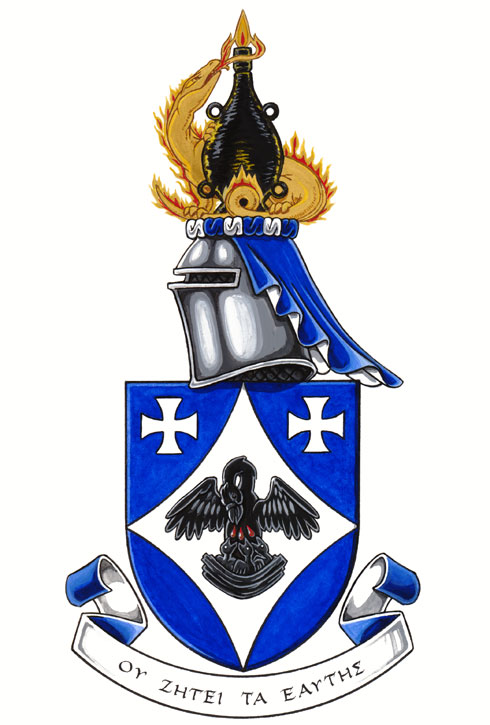- The Governor General of Canada

The contents of this Register are intended for research purposes only. The heraldic emblems found in the Register may not be reproduced in any form or in any media without the written consent of the Canadian Heraldic Authority and/or the recipient.
Claude La Charité
Saint-Eugène-de-Ladrière, Quebec
Grant of Arms
July 15, 2015
Vol. VI, p. 533

[ previous page ]
Blazon
Arms
Argent a pelican in its piety Sable, vestu enarched Azure, in chief two crosses patté Argent;
Crest
An amphora Sable issuant therefrom a flame proper entwined about by a salamander Or all enflamed proper;
Motto
ΟΥ ΖΗΤΕΙ ΤΑ ΕΑΥΤΗΣ;
Symbolism
Arms
The pelican, a Christian symbol of charity, represents Dr. La Charité’s surname and underscores his Catholic faith. The segments in the corners of the shield, reminiscent of theatre curtains, refer to the work of the celebrated satirical Renaissance writer François Rabelais, whose work Dr. La Charité has studied in depth. The crosses patté are taken from Rabelais’ armorial bearings; for Dr. La Charité, they convey a connection between the Old World and the New, and between Antiquity and the Renaissance. The cross also alludes to the Abbey of Cluny to which the priory of La Charité-sur-Loire, the birthplace of the first Canadian ancestor, Jean-Baptiste Laspron dit La Charité, was attached.
Crest
The salamander, the badge of King Francis I, symbolizes the “discovery” of Canada in 1534 under his reign, as well as the period of literary history that Dr. La Charité specializes in. A mythical animal, it represents his interest in imagination and literature. The lamp is used heavily throughout Rabelais’s works, particularly among the Lychnobites (“those who live by lanterns”), a term Rabelais experts, like Dr. La Charité, use to describe themselves as people who work late by lamplight.
Motto
This motto in ancient Greek reflects the definition that St. Paul gives to love and charity in the first letter to the Corinthians 13:5. It is also the motto of Rabelais’ giant Gargantua. Meaning “It seeks not its own”, it makes a pun on Dr. La Charité’s name, the pronoun referring to “charity”.
